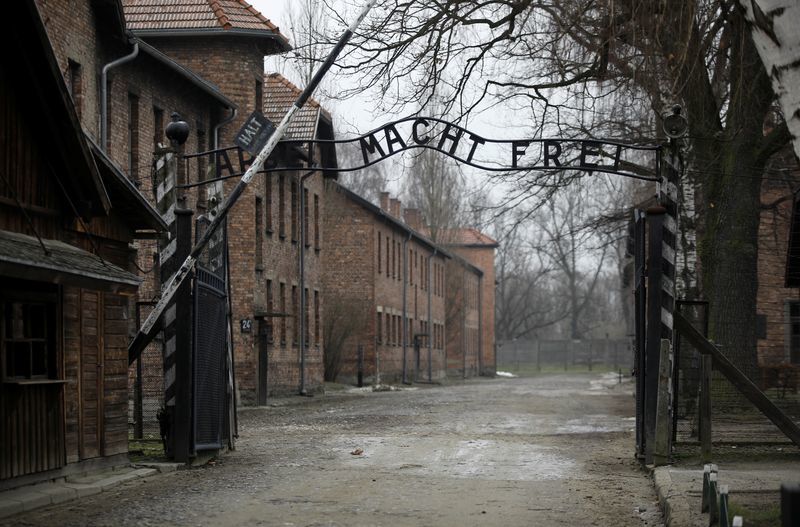
OSWIECIM, Poland (Reuters) – Marian Turski, a 94-year-old survivor of the Auschwitz death camp, will mark the 76th anniversary of its liberation by Soviet troops on Wednesday only virtually, aware that he might never return as the coronavirus pandemic drags on.
Survivors and museum officials told Reuters they fear the pandemic could end the era where Auschwitz’s former prisoners can tell their own stories to visitors on site. Most Auschwitz survivors are in their eighties and nineties.
“Even if there was no pandemic, there would be fewer survivors at every anniversary,” Turski told Reuters in a Zoom interview from his Warsaw home.
“People at my age who are already vulnerable to many other illnesses are also in the first line of fire for this virus.”
He declined an in-person interview, in part due to the pandemic risks.
The Auschwitz-Birkenau Museum and Memorial preserves the Auschwitz death camp set up on Polish soil by Nazi Germany during World War Two. More than 1.1 million people, most of them Jews, perished in gas chambers at the camp or from starvation, cold and disease.
Wednesday’s ceremony marking the camp’s liberation will take place virtually starting at 1500 GMT, with speeches by survivors, Poland’s President Andrzej Duda and Israeli and Russian diplomats, as well as a debate on the Holocaust’s influence on children.
Other virtual ceremonies will also take place to mark Holocaust Remembrance Day.
The Memorial has been closed to visitors for 161 days due to the pandemic. In 2019 it was visited by around 2.3 million people. In 2020 that number dropped to around 502,000.
The Museum’s director, Piotr Cywinski, acknowledged virtual events and education programmes were not as effective in passing on the lessons of the Holocaust and World War Two.
“Nothing will replace witnessing the place in its authentic state, because this isn’t just about seeing and listening. This is about looking around, in your own steps, touching, experiencing different perspectives, understanding,” Cywinski told Reuters.
WARNING THE WORLD
Survivors emphasized the importance of finding ways to keep Auschwitz relevant after they can no longer tell their own stories, amid a rise in far-right movements and anti-Semitism.
“A place like Auschwitz will continue to have visitors because they want to know what lies at the end of this, what these ideologies that are dazzlingly put before them really mean in the end,” said Christoph Heubner, the vice president of the International Auschwitz Committee.
Pope Francis urged people to keep a close watch on ideological extremism, because “these things can happen again”.
He spoke three weeks after displays of anti-Semitism surfaced at the U.S. Capitol riot on Jan. 6 and two weeks after one of Montreal’s largest synagogues was vandalised and almost set on fire.
Speaking at his general audience, held inside the papal library because of coronavirus restrictions, Francis said it was imperative that the world did not forget.
“To remember … means being careful because these things can happen again, starting with ideological proposals that claim to want to save a people but end up destroying a people and humanity,” he said.
Some Auschwitz survivors, like Bogdan Bartnikowski, 89, said they were optimistic that the pandemic would not end their chances of returning to the memorial and telling their stories.
“I have hope that for sure there will continue to be groups of visitors to the museum,” Bartnikowski said. “Us former prisoners will not be lacking.”
Reporting by Joanna Plucinska and Kacper Pempel; additional reporting by Philip Pullella; Writing by Joanna Plucinska; Editing by Mike Collett-White
Image: FILE PHOTO: The “Arbeit macht frei” (Work sets you free) gate is pictured on the site of the former Nazi German concentration and extermination camp Auschwitz, empty due to COVID-19 restrictions, two days before the 76th virtual anniversary of the liberation of the camp in Oswiecim, Poland, January 25, 2021. REUTERS/Kacper Pempel




